八下英语unit9 4课时
人教新目标八下同步课时训练:Unit 9 Section A (3a-4c)(含答案)

[Unit 9 Section A (3a-4c)]Ⅰ.用方框中所给单词的适当形式填空1.The young bird can feed ________ now.2.The old man loves living in the ________ countryside.3.Three ________ are visiting our school now.4.I like watching the children's ________.5.I want to go to the ________. Can you show me the way?6.Bob's father has ________ to Beijing and he will get back in two weeks.7.It's the ________ movie that I've ever watched. I like it very much.8.Mary is worried, because she doesn't know how ________ English well.9.It's ________ that such a little boy can sing so well.10.My teacher always works out math problems in an ________ way.Ⅱ.改写句子按括号中的要求完成句子,每个空格填一个单词11.I've been to the art museum many times. (改为一般疑问句)________you ________ to the art museum many times?12.She has ever been camping outside. (改为否定句)She has ________ ________ camping outside.13.My father will come back home__in__two__days. (对画线部分提问)________ ________ will your father come back home?14.Getting different kinds of good food there is very easy. (改写句子,句意不变)________very easy ________ ________ different kinds of good food there.15.She has made rapid progress. (改写句子,句意不变)She has ________ in a ________ way.Ⅲ.完成句子根据汉语意思完成英语句子,每个空格填一个单词16.我们了解到随着科技的发展,人们的生活发生了很大的改变。
新目标(人教)八年级下册英语 作业课件 Unit 9 第四课时

3.I don't know whether (是否) my mother will
come or not tomorrow. 4.In s pring ,the trees turn green and the
flowers come out. 5.It's not s afe
to swim in the river.It's a
( B )3.A.to C.at
( C )4.A.them C.themselves
B.for D.in B.oneself D.himself
there.They've 5 to many great places.During the first two days,they went to Tian'anmen Square.It
Internet hits(点击) a day.
A.thousand
B.thousands
C.thousands of
D.thousand of
thousands of“成千上万的”。
( B )2.熟词生义—Could you help me to solve the
problem? —Are you kidding?That's the problem which
seed vault in the world—the Svalbard Global Seed Vault—and it has seeds from a lot of different countries.
The vault is on the island of Spitsbergen.The island is about one thousand kilometers from the North Pole.It's a very cold place so it's good for
人教版新目标英语八年级下册:Unit 9《Have you ever been to museum》 讲解+练习题目+答案
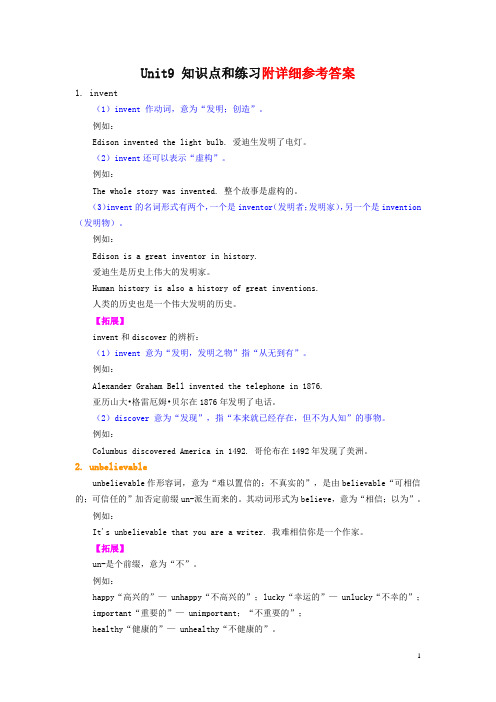
Unit9 知识点和练习附详细参考答案1. invent(1)invent 作动词,意为“发明;创造”。
例如:Edison invented the light bulb. 爱迪生发明了电灯。
(2)invent还可以表示“虚构”。
例如:The whole story was invented. 整个故事是虚构的。
(3)invent的名词形式有两个,一个是inventor(发明者;发明家),另一个是invention (发明物)。
例如:Edison is a great inventor in history.爱迪生是历史上伟大的发明家。
Human history is also a history of great inventions.人类的历史也是一个伟大发明的历史。
【拓展】invent和discover的辨析:(1)invent 意为“发明,发明之物”指“从无到有”。
例如:Alexander Graham Bell invented the telephone in 1876.亚历山大•格雷厄姆•贝尔在1876年发明了电话。
(2)discover 意为“发现”,指“本来就已经存在,但不为人知”的事物。
例如:Columbus discovered America in 1492. 哥伦布在1492年发现了美洲。
2. unbelievableunbelievable作形容词,意为“难以置信的;不真实的”,是由believable“可相信的;可信任的”加否定前缀un-派生而来的。
其动词形式为believe,意为“相信;以为”。
例如:It's unbelievable that you are a writer. 我难相信你是一个作家。
【拓展】un-是个前缀,意为“不”。
例如:happy“高兴的”— unhappy“不高兴的”;lucky“幸运的”— unlucky“不幸的”;important“重要的”— unimportant;“不重要的”;healthy“健康的”— unhealthy“不健康的”。
人教版英语八下英语unit9第四课时教学设计

中学备课学校中学年级八下英语教师课题Unit9 Have you ever been toan amusement park?日期2014-3备课项目首备区域复备区域备课标与教材10分1、系统分析课标的目标要求与实施建议、教材的知识体系,比较分析课标与教材的联系(4分);比较分析课标与教材的关系。
一、语言技能:本课时完成unit 9 Reading1、Listening: Reading听力内容。
重点学习语言材料为基点,强化学生对reading中的句式和短句、短语的理解,体会结构含义,注重学生的句式整体运用能力。
2、具体教学内容:1)词汇: 单词和词组:southeast, wonderful, holiday,quarter, population, simply, fear, brave, excellent, India,dark, wake, wake up, fox, natural, environment,temperature, all year round, equator, whenever, spring,autumn, season, awake, type, be far from2)句型:Have you ever been to Singapore?This small island is a wonderful place to take a holiday.On the one hand, more than three quarters of thepopulation are Chinese.On the other hand, Singapore is an English-speakingcountry.A lot of animals only wake up at night/ during the time.This is because the island is so close to the equator.It’s not too far from china.You won’t have any problem finding rice.根据课标语言要求和语言信息完成对本课时相关的句型,和语言材料知识的理解和结构性领悟(有相当几个句子是中考要点,)2、Speaking: 学习Reading,结合语言内容和课时要求,强化学生的阅读理解能力的培养和阅读方法指导,对于本课时语言知识的理解和整合运用适当延伸和话题知识的整合;形成阅读能力二、语言知识(一)1)词汇: 单词和词组:2)句型:强化阅读策略指导阅读后记录三到四个句子单词的学习放在句子中去领会与练习在教学过程中学习理解本课时的词汇、句型,,完成个体性,小组性合作阅读训练。
八下英语课文九单元讲解

八下英语课文九单元讲解
八年级下册英语课本九单元的主题是“春天”,这是一个非常适合讨论和学习的主题。
下面是该单元的主要内容:
1. 课文讲解:本单元的课文主要讲述春天的一些特点和活动,包括春天的气候、植物生长、动物活动以及人们在春天进行的活动。
通过学习这篇课文,学生可以了解到春天的各种特点,增强对自然季节变化的认识。
2. 语法点:本单元的语法点是现在进行时,表示正在进行的动作或正在发生的事情。
通过学习这个时态,学生可以更好地理解英语中的时态变化,提高英语表达能力。
3. 词汇和短语:本单元的词汇和短语主要与春天和自然有关,例如“鲜花盛开”、“蝴蝶飞舞”、“放风筝”等。
学生需要掌握这些词汇和短语的拼写、发音和用法,以便在阅读、写作和口语交流中正确使用。
4. 练习和活动:本单元的练习和活动旨在帮助学生巩固所学知识,提高英语应用能力。
学生可以通过完成各种练习和活动,如填空、翻译、写作等,加深对春天和现在进行时的理解,提高英语表达能力。
总之,八年级下册英语课本九单元的主题是春天,通过学习这个单元,学生可以了解春天的特点和活动,掌握现在进行时的用法,提高英语应用能力。
同时,学生也可以更好地理解自然季节的变化,培养对大自然的热爱和尊重。
2014八年级下英语unit9学案
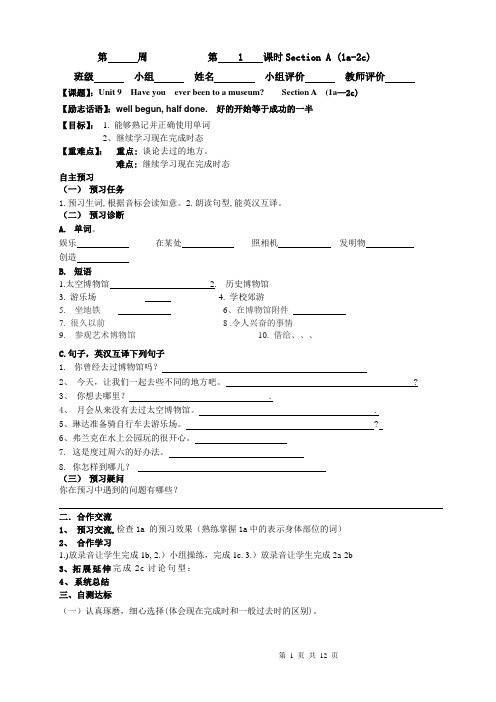
第周第 1 课时Section A (1a-2c)班级小组姓名小组评价教师评价【课题】:Unit 9 Have you ever been to a museum? Section A (1a—2c)【励志话语】:well begun, half done. 好的开始等于成功的一半【目标】:1. 能够熟记并正确使用单词2、继续学习现在完成时态【重难点】:重点:谈论去过的地方。
难点: 继续学习现在完成时态自主预习(一)预习任务1.预习生词,根据音标会读知意。
2.朗读句型,能英汉互译。
(二)预习诊断A.单词。
娱乐在某处照相机发明物创造B.短语1.太空博物馆__2. 历史博物馆______________3. 游乐场____________ ___4. 学校郊游____________5. 坐地铁_____ 6、在博物馆附件7. 很久以前_________ 8 .令人兴奋的事情______________________9. 参观艺术博物馆__________________ 10. 借给、、、___________________C.句子,英汉互译下列句子1.你曾经去过博物馆吗?2、今天,让我们一起去些不同的地方吧。
?3、你想去哪里? .4、月会从来没有去过太空博物馆。
.5、琳达准备骑自行车去游乐场。
?6、弗兰克在水上公园玩的很开心。
7. 这是度过周六的好办法。
8. 你怎样到哪儿?(三)预习疑问你在预习中遇到的问题有哪些?二.合作交流1、预习交流,检查1a 的预习效果(熟练掌握1a中的表示身体部位的词)2、合作学习1.)放录音让学生完成1b,2.)小组操练,完成1c.3.)放录音让学生完成2a-2b3、拓展延伸完成2c讨论句型:4、系统总结三、自测达标(一)认真琢磨,细心选择(体会现在完成时和一般过去时的区别)。
二、句型转换:1、They have been here since 2000. (对划线部问)have they been here?2、The old man _________ last year. He for a year. (die)(动词填空)3、Miss Gao left an hour ago. (同义句转换)Miss Gao ________ _______ ________ ________ an hour ago.4、Her mother has been a Party member for three years .(同义句)Her mother _______ the Party three years ________ .(三)写出下列动词的过去式和过去分词is _____ _______ write ________ _ _________ read _______ _______ _study _______ ________ have _______ _______ __ eat ______ _______start______ _______ live______ _______ help ________ _________travel_ ______ _______ say_______ ________ hear______ __________(四)根据首字母完成单词使句子意思完整, 通顺1. Have you ever b_________ to a museum?2. They h ave g_____ to see the movie. It’s so interesting.3. I hope that they will have a wonderful time in the a park.4. ------I have never seen such an interesting water park.----Me n .5. I like animals in water . So I’m going to an a四、学后反思通过本节课的学习我最大的收获_________________________________感到自己有待加强的是_第周第 2 课时Section A (2d-3c)班级小组姓名小组评价教师评价【课题】Unit 9 Have you ever been to a museum? Section A (2d-3c)【励志话语】:Industry is the parent of success. 勤奋是成功之母【目标】:1.能够熟记并正确使用下列单词和短语:2. 掌握常用动词的过去分词的拼写形式以及熟练掌握现在完成时的应用3.培养学生的阅读能力。
部编版八年级英语下册Unit9Haveyoueverbeentoamuseum必考知识点归纳

(名师选题)部编版八年级英语下册Unit9Haveyoueverbeentoamuseum必考知识点归纳单选题1、—Could you tell me ________? I must find him.—Sorry. I have no idea. But he was here just now.A.where Tom wasB.where Tom has goneC.where can I find TomD.where Tom has been答案:B句意:——你能告诉我汤姆去了哪里吗?我必须找到他。
——对不起。
我不知道。
但他刚才还在这里。
考查宾语从句和现在完成时。
根据题干“Could you tell me…”可知,此处应为宾语从句,要用陈述句语序,可排除C选项;主句中的“Could you tell…”是委婉语气,结合“I must find him”和语境,可知汤姆不在说话现场,需用现在完成时“has gone”结构。
故选B。
2、—Do you mind my smoking here?—___________. Look at the sign. It says “No smoking”.A.It doesn’t matterB.No, not at allC.You’d better notD.Never mind答案:C句意:——你介意我在这吸烟吗?——你最好不要。
看指示牌。
它标明禁止吸烟。
考查情景交际。
It doesn’t matter没关系; No, not at all不,根本不;You’d better not你最好不; Never mind 不要介意。
根据“It says ‘No smoking’.”可知,应是反对在这吸烟,通常用“You’d better not.”表示委婉拒绝。
故选C。
3、There are about three ________students in our school.A.thousandsB.thousands ofC.thousandD.thousand of答案:C句意:我们学校大约有三千名学生。
人教新目标版初中英语八年级下册Unit9Haveyoueverbeentoamuseum要点讲解
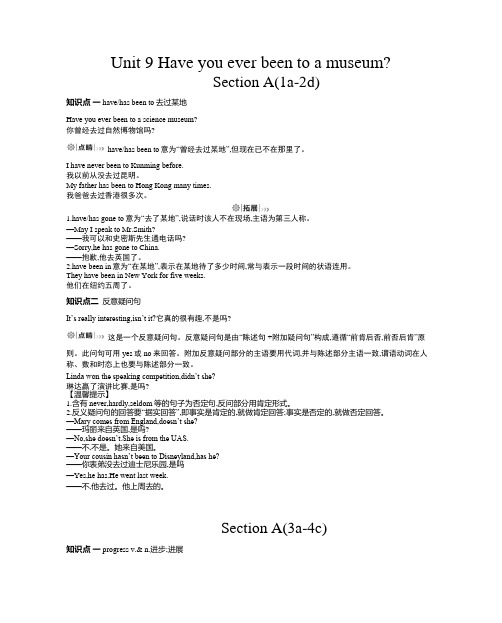
Unit 9 Have you ever been to a museum?Section A(1a-2d)知识点一have/has been to去过某地Have you ever been to a science museum?你曾经去过自然博物馆吗?have/has been to意为“曾经去过某地”,但现在已不在那里了。
I have never been to Kunming before.我以前从没去过昆明。
My father has been to Hong Kong many times.我爸爸去过香港很多次。
1.have/has gone to意为“去了某地”,说话时该人不在现场,主语为第三人称。
—May I speak to Mr.Smith?——我可以和史密斯先生通电话吗?—Sorry,he has gone to China.——抱歉,他去英国了。
2.have been in意为“在某地”,表示在某地待了多少时间,常与表示一段时间的状语连用。
They have been in New York for five weeks.他们在纽约五周了。
知识点二反意疑问句It’s really interesting,isn’t it?它真的很有趣,不是吗?这是一个反意疑问句。
反意疑问句是由“陈述句 +附加疑问句”构成,遵循“前肯后否,前否后肯”原则。
此问句可用yes或no来回答。
附加反意疑问部分的主语要用代词,并与陈述部分主语一致,谓语动词在人称、数和时态上也要与陈述部分一致。
Linda won the speaking competition,didn’t she?琳达赢了演讲比赛,是吗?【温馨提示】1.含有never,hardly,seldom等的句子为否定句,反问部分用肯定形式。
2.反义疑问句的回答要“据实回答”,即事实是肯定的,就做肯定回答;事实是否定的,就做否定回答。
—Mary comes from England,doesn’t she?——玛丽来自英国,是吗?—No,she doesn’t.She is from the UAS.——不,不是。
Unit9单元讲义人教版八年级英语下册

Unit9 Have you ever been to a museum?单词短语及重点句型一、单词讲解1 somewhere adv.在某处;到某处somewhere 不定副词,意为“某地”。
go somewhere different 意为“去与众不同的某地,去某个独特的地方”。
I want to go somewhere different and live alone. 我想去一个与众不同的地方独自生活。
拓展:由some, any, no, every分别加上where构成的副词叫不定副词。
即:somewhere 某个地方, anywhere 任何地方, nowhere 无处,哪里都不, everywhere 每个地方。
2 invent v.发明;创造1)invent 作动词,意为“发明;创造”。
Edison invented the light bulb. 爱迪生发明了电灯。
2)invent还可以表示“虚构”。
The whole story was invented. 整个故事是虚构的。
3)invent的名词形式有两个,一个是inventor(发明者;发明家),另一个是invention(发明物)。
Edison is a great inventor in history. 爱迪生是历史上伟大的发明家。
辨析:invent和discover的辨析:①invent 意为“发明,发明之物”指“从无到有”。
Alexander Graham Bell invented the telephone in 1876. 亚历山大•格雷厄姆•贝尔在1876年发明了。
②discover 意为“发现”,指“本来就已经存在,但不为人知”的事物。
Columbus discovered America in 1492. 哥伦布在1492年发现了美洲。
3 unbelievable adj.难以置信的;不真实的unbelievable作形容词,意为“难以置信的;不真实的”,是由believable“可相信的;可信任的”加否定前缀un派生而来的。
人教版八年级下册英语Unit9_第2课时( 3a-4c)
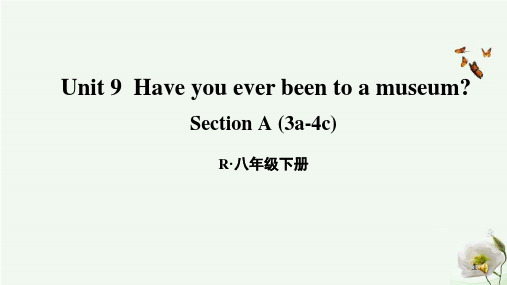
The museum teaches people about the history and development of toilets. It also encourages governments and social groups to think about ways to improve toilets in the future.
encourage 及物动词,鼓励 encourage sb. to do sth. 鼓励某人去做某事
Linlin: Last year I went to the Hangzhou National Tea Museum. It’s a relaxing and peaceful place near a lake. The tea art performances show how to make a perfect cup of tea with beautiful tea sets.
computers and who invented them. The old
computers were much bigger.
information 意为“信息”,指通过各种途 径获得的任何关于某人或某物的信息。 一条信息:a piece of information
以如此快 的方式 It’s unbelievable that technology has progressed in such a rapid way! I’ve also learned that there was a special computer. It could play chess even better than humans. I wonder how much more computers will be able to do in the future.
2024-2025学年人教八年级英语下册4.Unit9第四课时课件

(4) N__ig_h_t__S_a_fa_r_i_
It is (5) _a_l_m_o_s_t_t_h_e _s_a_m__e all year round.
探究点三 Reading
2b Read the article. How many reasons
Made up: main island 63 small islands Area: 697.1 square kilometres. Population: 3,437,300 (Chinese 76.2%, Malays 13.8%, Indians 8.3%, Others 1.7% )
Fill in the blanks according to the article.
e.g. It seems like years since I last saw her. 自从上次遇到她, 好像已过了许多年。
d) seem to do. e.g. He seems to be happy.
他好像很高兴。
My mother seemed to know that. 我妈妈好像知道那件事。 e) It seems that + 从句 e.g. It seems that he is happy. = He seems (to be) happy. 他好像很快乐。
Singapore’s geographical position (地理位置) Language(s) people speak in Singapore
Food we can find in Singapore
A small island (1)
_i_n__S_o_u_t_h__e_a_s_t _A_s_ia
人教版初中英语八年级下册 Unit9 SectionA Grammar Focus-4c导学案设计(

人教版初中英语八年级下册Unit 9 Have you ever been to a museum?(Section A Grammar Focus-4c)学案一、核心素养1.学习掌握下列词汇:a couple of German theme ride province2.进一步复习巩固学习Section A 部分所学的生词和词组。
3.复习和学习现在完成时态的用法。
①含been, ever, never的现在完成时②have/has been to,have/has gone to;have/has been in的区别。
③现在完成时与一般过去时的区别。
4.能够准确使用多种时态谈论自己的经历。
二、教学重难点1. 教学重点:1).现在完成时的两个用法。
2).现在完成时与一般过去时的区别。
2.教学难点:have/has been to,have/has gone to;have/has been in的区别。
三、自主学习Step 1.ReviewLast class, we have learned something aboutpresent perfect tense.(现在完成时)Now let's have a review.Fill in the blanks.1.— _____ you ____ ____to a science museum?—Yes, I ____. I went to the National Science Museum last year.2. —_____ you ____ ____ to a historymuseum?— No, I _______.— __________. (我也没去过)3. ____ these students ___ _____to these place?4.—_____ you ____ to the art museum?—I _____ _____to the art museum many times.5. —How about the nature museum? I_________ there a few times.—____(我也去过). I went there on our last school trip.6. Let’s go to the space museum. I ____ _____ _____there.Step 2. PresentationStep 3. Grammar FocusRead the Grammar Focus togetherever 和never在现在完成时中的用法have been to,have gone to, have been in的区别现在完成时和一般过去时的区别Step 4. PracticeStep 5. Work on 4aTell Ss to put the correct forms of the verbs in the blanks.1. A: Do you want________ (come) to the space museum?B: No, I’ve already _______ (be) there three times.2. A: Have you _______ (see) the robots at the science museum?B: Yes, I _______ (go) there last weekend.3. A: Let’s _______ (spend) the day at the zoo.B: Well, I’ve already ______ (be) there a couple of times, but I’m happy ______ (go) again.4. A: How about _______ (go) to the art museum? There are some special German paintings there right now.B: Sure. When do you want _______ (go)?5. A: Have you ever _______ (visit) the history museum?B: No, I’ve never ________ (be) there.Step 6. Work on 4bFill in the blanks with the correct forms of the verbs in brackets.Most of us ________ (see) Mickey Mouse, Donald Duck and other famous Disney characters in cartoons before. But have you ever ____ (be) to Disneyland? Disneyland __ (be) an amusementpark with a special theme —Disney charactersand movies. There ___ (be) many exciting rides, lovely restaurants and fantastic gift shops there. You can also ___ (see) the Disney characters walking around the park. And have you ever _____ (hear) of a Disney Cruise? This __ (be) a boat ride with a Disney theme. You can ____ (take) a ride on the boat for several days and eat and sleep on it. On the boat, you can ___ (shop) and have Disney parties before you ______ (arrive) at the Disney island.Step 7. Work on 4c四、合作探究1. ever“曾经”,一般用于疑问句和肯定句2. never“从来没有”,一般用于否定句have/has been to,have/has gone to;have/has been in的区别。
新目标八年级下Unit9课件

Location: Where is Singapore?
in Southeast Asia
Careful reading
On the one hand…on the other hand… (一方面,另一方面) 一方面,另一方面 一方面 It’s a good place to ... 的好地方) (是做..….的好地方) 是做 的好地方
New words and expressions
southeast wonderful population quarter fear brave excellent safari type environment natural temperature equator whenever spring autumn season awake
¾ of the population are…
Chinese food
western food
Indian food
Japanese food
have …problem (in) doing sth 做...有困难 ...有困难
Careful reading 1. Singapore has a special zoo the “Night Safari” called __________________. wake up 2. A lot of animals ________ at the best time night, so this is_____________ to watch them. 3. At the zoo, you can watch lions,tigers, and foxes in a more natural environment ____________ than a normal zoo.
呼和浩特市二中八年级英语下册Unit9HaveyoueverbeentoamuseumPeriod4

Unit9 Haveyoueverbeentoamuseum?Period4 SectionB1a—1d【课型】听说课学习目标1.学习并掌握下列单词:Terracotta,Nest,Palace2.学习并掌握下列常用表达:Have you visited...Have you been to...Have you seen...Have you tried....3.学习并掌握下列句型:(1)Have you been to the Great Wall?(2)Have you been to the Bird’s Nest?(3)Have you seen the Terracotta Army?(4)Have you tried Chinese food?(5)Have you visited the Palace Museum?学习过程【课前预习】根据句意和提示完成单词1.I love Beijing Duck.It’s so d .2.How long have you been China?3.There were so many beautiful a parks.【课堂探究】探究一:have/has been to,have/has gone to与have/has been in的区别:①have/has been to...意为“已去过……(某地)”。
表示。
Mr.Li has been to the place of interest.Let’s go and ask him if we can get there by bus.李先生曾去过那个旅游胜地。
让我们去问问他我们可否乘巴士去那里。
②have/has gone to...意为“已到……(某地)去了”。
表示。
The teacher has gone to Xi’an.He will be back next Saturday.老师去西安了,他下周六回来。
【初中英语】人教版八年级下册Unit 9 第4课时分层训练(Section B2 2a—2e练习题

人教版八年级下册Unit 9 第4课时分层训练(Section B2 2a—2e)(1022)1.—Do yo u k no w o r n o t th e sc ie n tis t will c o me to ou r s ch oo l to mo r r o w?—So r r y,I d o n't k n o w.B u t h e c o me s, I'll g ive yo u a ca ll.()A.wh e the r; ifB.if; whe th e rC.if; ifD.wh e the r; wh e th e r2.—M a r ia,ha ve yo u s e e n th a t a r tic le ab o u t to u c h-s c r ee n c o mp u ter in Mo n da y's p a p e r?—Ye s.It te lls u s h ow to u se the co mp u te r .()A.s lo wlyB.s ilen tlyC.s imp lyD.g e n tly3.It is e x pe c ted tha t P a c if ic Is la n d c ou n tr ie s will b e co me p op u la r with Ch in e se tou r is ts in(1)W h ic h c o un tr y is th e f ir s t o n e to s ta r t a n e w da y?()A.P a pu a Ne w G u in e a.B.Kin g do m o f Ton ga.C.T he R e pu b lic o f Van u a tu.D.Fiji.(2)P eo p le g o to Fiji f o r th e ir h o lida ys ma in l y b e c a u se.()A.th in g s th e re a re we ll wo r th se e ingB.the un de r wa te r p o s t o ff ic e is e x c itingC.the y wa n t to s ta y in th e R o ya l P a lac eD.it is th e la rg e s t P a cif ic Is la n d co u n tr y(3)W h ic h la n gu a ge is s p o ke n in a ll th e fo u r P a c if ic Is la nd co u n tr ie s?()A.Tok P is in.B.Fr e n c h.C.B is la ma.D.E ng lis h.(4)W ha t is the pu r po se o f th e p a s sa g e?()A.To a sk f o r s o me he lp.B.To in tr od u ce lan g uag e s.C.To a n s we r a qu e s tion.D.To o ff e r h o lida y c h o ic e s.(5)Yo u ma y f in d th is p a s s ag e in a .()A.n e ws pa pe rB.d ic tio na r yC.gu ide b oo kD.fa s h ion ma g az in e4.Tr a ve l c an tea c h k ids mo r e th an a te x tbo ok.Tr a ve lin g with k id s is go od26.fth e m.Th e y c a n f in d n e w in te r e s ts.Tra ve l ma k e s in f o r ma tio n a live f o r k id s,a nd ma k e s it mu c h mo r e ex c itin g th a n s tu d yin g te x tb oo k s o r 27. d e xp e r ime n ts in th ela b.W h ile tr a ve lin g,th e y le a r n 28.h to d e a l with n e w s itu atio n s an d c o mmu n ic a te with o th e r p e op le.Th e y le a r n p a tie nc e,b e c au s e so me time s 29.i tak e s a lo n g time to g e t to so me e x c iting o r in te r e s ting p la c es.I've b e e n tr a ve ling s inc e I wa s s e ve n ye a r s o ld.Fo r me,to s to p tr a ve lin g wo u ld be like ta k in g s o me th in g 30.a f ro m my s o u l(灵魂).I c an't li ve with o u t tra ve lin g an d Iwo u ld n't b e who I a m if I d o n't tr a ve l.S ome p e o p le th ink it's31.h to tr a ve l a f te r h a vin g k id s.Bu t in my o p in io n,wh e n pe ople be c o me p a re n ts,it d o e sn't 32. m th e y c o u ldn't tr a ve l a n y mo r e.M y c h ild r e n h a ve b ee n tr a ve ling s inc e th e y we r e th r e e we e k s o ld.B r ing in g a n e w lif e in to th e wo r ld co me s with ma n y r e s p o n s ib ilitie s(责任) a n d I'd lo ve to b e a g oo d mo th e r.On e o f my d u tie s is to 33.e my c h ild r e n.I'm s o th a nk f u l th a t my p a r en ts to o k me on f amil y tr ip s wh e n I wa s 34.y.I've le a r n ed th a t th e o u ts ide wo r ld is mo r e c o lo r fu l th a n th e little on e I wa s livin g in.O f c o u rs e,I wa n t to p a s s the s e tr a ve l35.e o n to my c h il d r e n.I va lu e th e m e mo r ie s I h a ve tr a ve lin g with my c h ild r e n.I'm s u r e th e y will a lwa ysr e me mb e r th e s e me mo r ie s in the ir live s.(1)(2)(3)(4)(5)(6)(7)(8)(9)(10)5.(1)—C an I g o to d a y o r to mo r r o w?—yo u lik e.(2)—W h a t time d o yo u u su a lly in th e mo r n in g?—U s u a lly a t s ix o'c lo c k.(3)In C h in a s tude n ts d re a m o f g o ing to P e k ing U n ive r s ity.(4)J e nn y is ill in h o s p ita l, an d s h e tha t sh e will n o t c a tch u p with he r c la s s ma te s wh e n s h e is b a ck to s ch o o l.(5)Th e te mp e ra tu r e is a lmo s t th e s a me in S in g ap o r e .6.Sh e d id n't f e e l (s a f e) o n h e r o wn.7.M y s is te r h a s ta u gh t (J a p an)in a u n ive r s ity in th e p a s t two ye a r s.8.Th e re a r e s o me(f ox)livin g in th e jun g le.9.I me t s o me(Ind ia)on my wa y h o me.Th e y a s k e d me th e wa y to th e ho te l.10.—Wh a t sp o r ts d o th e bo ys in yo u r c la s s lik e?—(mo s t)ba s ke tb a ll a n d f o o tb a ll.11.T he(pe a ce)mu s ic will ma k e yo u f e e l r e la xe d.12.无论你是坐出租车还是坐地铁,你都必须按时到达那里。
人教版初中八年级英语下册第九单元Unit 9 教案含教学反思

Section A 单词camera n.照相机;摄影机;摄像机unbelievable adj.难以置信的;不真实的progress v.&n.进步;进展rapid adj.迅速的;快速的unusual adj.特别的;不寻常的toilet n.坐便器;厕所encourage v.鼓励social adj.社会的peaceful adj.和平的;安宁的perfect adj.完美的;完全的itself pron.它自己collect v.收集;采集German adj.德国的;德语的;德国人的n.德语;德国人ride n.供乘骑的游乐设施;短途旅程province n.省份amusement n.娱乐;游戏somewhere adv.在某处;到某处invention n.发明;发明物invent v.发明;创造performance n.表演;演出theme n.主题短语amusement park游乐场lead to导致put up搭起think about考虑make tea沏茶tea art 茶艺tea set茶具equator n.赤道短语take a holiday度假three quarters四分之三at night在夜晚all year round全年be close to 靠近be far from远离……thousands of 数以千计的;许许多多的whether…or…不管……还是……on the one hand…on the other hand…一方面……另一方面……句型1.On the one hand,more than three quarters of the population are Chinese,so you can simply speak Putonghua a lot of the time. On the other hand,Singapore is an English-speaking country,so it’s also a good place to practice your English! 一方面,超过四分之三的人口是华裔,因此很多时候你可以只说普通话。
八年级英语下册Unit9+Have+you+ever+been+to+a+museum全单元教案
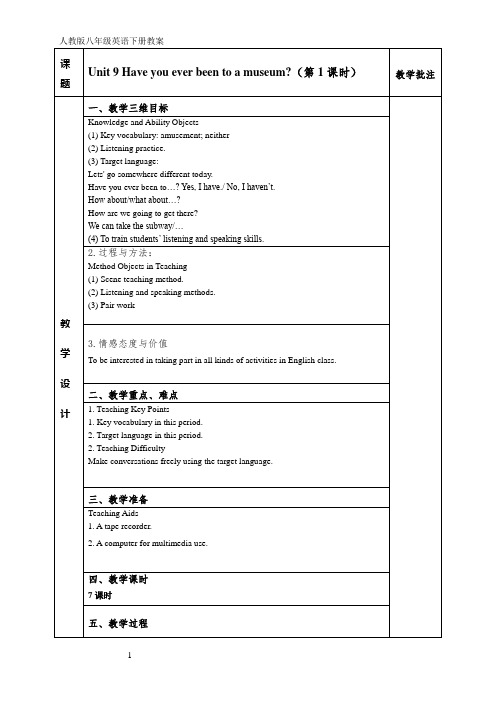
教学设计Listen again. Listen and check the boxes. Have these students ever been to these places?SciencemuseumHistorymuseumArt museum NaturemuseumSpace museum ClaudiaSarah √Step 5 SpeakingAsk and answer in pairs:A: let’s go somewhere different today.B: OK. Where do you want to go?A: Have you ever been to the space museum?B: No, I haven’t. How about you?A: …Step 6 Listening 2a 2bListen and circle the places that you hear.Listen again and circle T for true or F for false.Conversation 11. Tina went to the space museum last year. T/F2. John has never been to the space museum. T/F3. They are going to take the subway. T/FConversation 21. Linda has been to the amusement park. T/F2. Linda went to the amusement park yesterday. T/F3. Linda is going to the amusement park again by bike. T/FConversation 31. Frank had a great time at the water park. T/F2. Frank’s friend has never been to the water park. T/F3. Frank and his friend are going skating. T/FAnswer: TFT TFT FTTSpeakingLook at the map in 2a and make conversations about the places.A: Have you ever been to the space museum?B: Yes, I have. How about you?A: No, I haven’t.B: Oh, it’s fantastic. Let’s go tomorrow.A: OK. How are we going to get there?B: We can take the subway.SpeakingRole-play the conversation in 2d.Step 1 RevisionWhat do you know about Singapore?position: Where is Singapore?position: in Southeast AsiaPopulationMore than three quarters of the population are Chinese.LanguageChinese and English.FoodA lot of food from China, such as rice, noodles and dumplings.Indian food, western food and Japanese food.ZooSingapore has a special zoo called the “Night Safari”. A lot of animal only wake up at night, so this is the best time to watch them.WeatherThe temperature is almost the same all year round.Step 2 Writing3b Write an article to advertise your hometown or a place you have been to.句型:Have you ever tried/seen/been…?If you…, you will/can…You should…One great thing about …is…Step 3 Self check1. Think about the things below and write an answer for each one.1) One thing that you have collected before:_________________________________2) One invention that you have found to be very useful:_________________________________3) One unbelievable or unusual thing that you’ve seen or hea rd recently:_________________________________4) One way that you’ve used to encourage a friend in the past:_________________________________5) One peaceful and quiet place that you’ve been to recently:________________________________( )35.Which one can be the best title?A. Different animals in TanzaniaB. The ways of traveling in TanzaniaC. Why do we take a bus to travel?D. The beautiful country-TanzaniaBWhen you are in England,you must be very careful in the street because the traffic drives on the left. Before you cross a street,you must look to the right first and then the left. If the traffic lights are red,the traffic must stop. The people on foot can cross the road carefully. If the traffic lights are green,the traffic can go. The people on foot must not cross. In the morning and in the evening when people go to or come from work,the streets are very busy.When you go by bus in England,you have to be careful,too. Always remember the traffic moves on the left.So you must be careful. Have a look first or you will go the wrong way. In many English cities,there are big buses with two floors. You can sit on the second floor. From there you can see the city well. It is very interesting. ( )36.When you are in England, you must be more careful in the street because________.A. there are many cars and buses on the roadB. there are no traffic lightsC. the buses and cars move on the leftD. people on foot may cross the road( )37.In England,before you cross a street, you must look to first and then________.A. the right;the leftB.the left;the rightC. the front;the backD. the back;the front( )38. If the traffic lights are green, can go, mustn’t cross.A. the people on foot;the trafficB. the traffic;the people on bikeC. buses;carsD. the traffic;the pe ople on foot( )39. In England, you must always remember that the traffic _______.A. is busyB. moves on the leftC. moves on the rightD. with two floors ( )40. In many cities in England, there are big buses ________.A. with a lot of people in themB. with lots of seats in themC. with two floorsD. with interesting colors五.单词拼写(共10小题;每小题1分,满分10分)http://w ww.xkb 1. comA)根据首字母及汉语提示,完成下列单词的拼写,使句意明确,语言通顺。
八年级英语下册Unit9Haveyoueverbeentoamuseum英语说课稿

八年级英语下册Unit+9+Have+you+ever+been+to+a+museum英语说课稿一、教材分析:1、教学内容:本单元是Go for it ( 下) Unit 9。
主要围绕“Have you ever been to a museum?”这一主题展开各种教学活动,并以这一主题引出现在完成时的一般疑问句,否定句以及特殊疑问句等语言功能。
本单元旨在创造一个轻松、愉快的学习、交流环境,通过听、说、读、写来培养学生综合运用这些知识的能力。
并让学生能在“做中学”(l earning by doing),通过有限的课堂实践活动,拓展以往的经历,能准确地用英语来表达。
2、教材的地位和作用:八年级下九单元Have you ever been to a museum?讲述的是现在完成时的用法,这是初中非常重要的时态之一。
学生们能够用现在完成时来表达自己的经历,来体会别人的感受是很重要的。
这个单元一定要体会现在完成时的真正含义和用法。
要避免混淆几个重点词组的使用。
我们更要使学生不仅理解枯燥的语法,还要让学生们会用新学的语法知识来表达思想。
3、教材的处理:根据《英语课程标准》(实验稿)关于总目标的具体描述,结合本单元这部分的教学内容及基于对教材的分析,我对本单元的内容进行如下处理,目的是突出重点,使课堂节奏紧凑,衔贯。
本单元分为四课时,第一课时是Section A,第二课时是Section B, 第三课时是Self Check, 第四课时是Reading,最后一部分是做练习,以学生的自测为主,然后予以校对。
二、教学目标:根据以上我对本单元教材内容的分析,我确定以下几个为本单元的教学目标:语言知识、语言技能、学习策略、情感态度和文化意识五个方面。
§1.语言知识:本单元要求学生掌握以下词汇(neither, theme, end up, especially, disc over, population, simply, fear, whenever)语言功能:学习和增加阅读技巧和阅读策略。
人教八年级英语下册 Unit 9 A(3a~4c)课时练习

人教八年级英语下册课时练习Unit 9Have you ever been to a museum?Section A(3a~4d)Ⅰ.请根据中文意思写出下列重点单词。
1.难以置信的;不真实的adj. unbelievable8.进步;进展v. & n. progress2.迅速的;快速的adj. rapid 9.特别的;不寻常的adj. unusual3.坐便器;厕所n. toilet 10.鼓励v. encourage4.社会的adj. social 11.和平的;安宁的adj. peaceful5.完美的;完全的adj. perfect 12.(it的反身代词)它自己pron. itself 6.收集;采集v. collect 13.德国的;德语的;德国人的adj.德语;德国人n. German 7.省份n. province 14.供乘骑的游乐设施;短途旅程n. ride Ⅱ.请认真阅读课文,找出下列重点短语。
15.以如此迅速的方式in such a rapid way 17.在未来in the future16.考虑think aboutⅢ.请用以上重点单词和短语完成下列句子。
18.令人难以置信的是科技以如此迅速的方式在进步!It's__unbelievable__that__technology__has__progressed__in__such__a__rapid__way!19.将来你打算做什么?What are you going to do in the future?1.I wonder how much more computers will be able to do in the future.我想知道将来计算机还能够做些什么事情。
(P67)wonder 作动词,意为“想知道”,相当于want to know,其后常接who/what/how/if/whether 等引导的宾语从句。
沅江市第五中学八年级英语下册Unit9Haveyoueverbeentoamuseum第四课时Sec

第四课时Section B (1a1d)1.复习学过的单词和短语2.熟练掌握现在完成时态1.重点单词和句型2.熟练掌握现在完成时态3.能够听懂对话录音能够听懂对话录音1.复习前三个课时学过的单词和短语2.复习现在完成时态的用法Step 1情景导入Teacher:Have you ever been to London?Student 1:No,I haven't.Teacher:Have you ever been to Beijing?Student 2:Yes,I have.Teacher:OK,now please ask and answer like this in pairs.环节说明:通过师生问答和学生互答,让学生复习了现在完成时态,同时也练习了口语。
Step 2完成教材1a1d的任务1.学生朗读表示地名的词组,教师纠正错误,然后用1a中的地名来练习对话,并且请几组学生来表演对话。
(5分钟)参考案例A:Have you been to the Great Wall?B:Yes,I have.Have you ever been there?A:No,I have never been there before.2.认真听一名中学生采访一名外籍学生的对话录音,标注出你所听到的问题,完成后集体核对答案。
(3分钟)3.再认真听一遍录音,完成1c的表格,请学生展示答案,教师点拨。
(3分钟)4.认真听第三遍录音,整体感知对话内容。
(4分钟)5.小组内互相询问对方去过的地方或者是做过的事情。
(5分钟)参考案例A:Have you visited the old people in People's Home?B:No,I haven't.How about you?A:I visited them last year.B:Sounds great.I think I am going to visit it next month.6.小结训练。
- 1、下载文档前请自行甄别文档内容的完整性,平台不提供额外的编辑、内容补充、找答案等附加服务。
- 2、"仅部分预览"的文档,不可在线预览部分如存在完整性等问题,可反馈申请退款(可完整预览的文档不适用该条件!)。
- 3、如文档侵犯您的权益,请联系客服反馈,我们会尽快为您处理(人工客服工作时间:9:00-18:30)。
教案第十五周6课时陈霞
Unit9Have you ever been to an amusement park
一:Contents section B( 1a__2c )
1:Teaching Aims :
<1>:check the exercises by oneself:
<2> Read the words and phrases in groups.
<3>: Talk about why you study English .
2:Teaching main aims:
<1>:main phrases and sentences :
English language movies English_speaking country
improve one’s English welcome to …
二:learning by oneself (自学)
step one:完成该学案的重点词和短语,并朗读,检查。
step two:write two reasons for learning English.
<1>__________________ <2>__________________________ 三:cooperation(合作)
Step one: talk about the importance for you to learn English.
Step two: read 1a的句子,勾出重点的短语and read them in groups。
Step three: Read the sentences in2a,understand them .
四:Training(训练):
Step one: Listen to 2a and finish it .
Step two :Listen again and finish 2b.
Step three: Pairwork 1b and 2c.
Step four:复习一般现在时用法:
step five :Do exercises in class.
Unit 9 Have you ever been to an amusement park ?
第四课时姓名:________
Contents section B( 1a__2c)
一:Preview(复习)
1:Key words phrases:(p71)按要求完成下列词和短语。
understand(过去分词)________交换生___________learn(过去分词)________ do(过去分词)____ 英语电影____________ 提高某人的英语 _________ 二:learning by oneself (自学)
step one:完成该学案的重点词和短语,并朗读,检查。
step two:说一说自己学英语的原因。
(1)___________________(2) ______________________ 三:cooperation(合作)
Step one:分组读1a.勾出重点的短语:
Step two:分组读1a理解句意,按对你的重要性排序。
Step three:分组读2a,画出重点短语并朗读。
四:Training(训练):
Step one: 听完成2a.
Step two:又听完成2b:
Step three: 分组练习1b and 2c .
练习:根据汉语提示完成下列句子:
1:(欢迎到)_______ to my class, I need to______ _____ _______ __________(问你一些问题).
2:The__________ _____(…的理由)learning English is to travel .
3: It’s fun to learn ________ _________(另一种语言).
课后练习
一:选词填空。
1:Have you ever been to Beijing?
No ,but I ______ ( have been to/went) to Shang hai last year .
2:He is an ________ (exchanged/exchange) student in this school.
3: Has he ______ (been ever/ever been) to China 。
4:He wants to study in an_____(English_speaking/speaking_English)country. 5:How long have you been ______(studied/studying)English ?
二:选择填空:
( )1:Have you watched the movie _______ ?
A: yet B: ever C: already
( ) 2: I’ve finished my homework .
When _____ you ______ it ?
A: have, finished B: did ,finish C: will, finish
( )3: They have been friends _______ they met at school .
A: when B: since C: until
( )4: They are thinking about _______ to Hai nan .
A: go B : going C;to go
( )5: Mr Smith has ______ a bank clerk for 5 years .
A: be B: got C: been
( )6 I have been______ English for about 2 years .
A: studying B: studied C:am studying。
